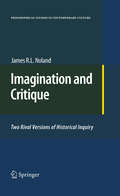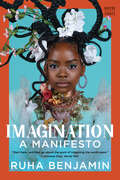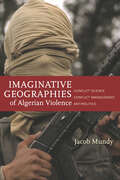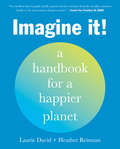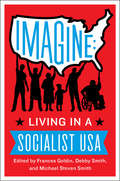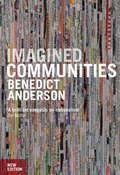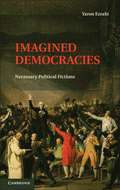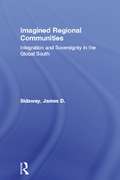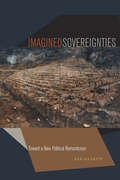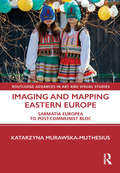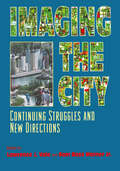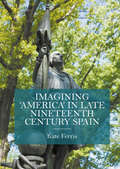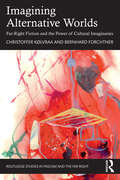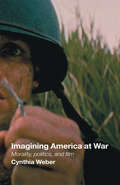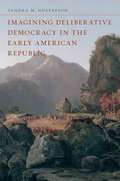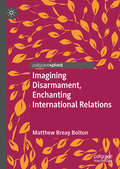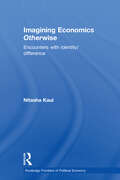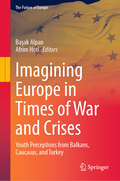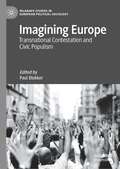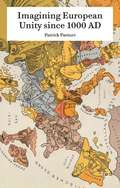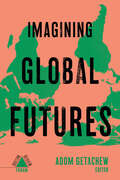- Table View
- List View
Imagination and Critique
by James R. NolandThis project is the result of a philosopher's extended engagement with the literature and practice of political science and public policy formation. One finds in these fields, and in social science generally, two fundamentally opposed approaches to inquiry into the nature and cause of historical political events. These two approaches, which are sometimes employed simultaneously, are both powerful and persuasive. Yet, the two accounts are incompatible and comprehensive. Making a choice between the two is not simply about choosing a view of history; the choice affects how one anticipates policy developments in the future, and, more importantly, how one seeks to influence and shape public policy now and in the years to come. Because there is no external standard of history by which to judge them, one must examine the conceptions of human nature, reason and freedom underlying each in order to adjudicate between the two. Following Alasdair MacIntyre's approach in Three Rival Versions of Moral Inquiry, this book analyzes and evaluates the internal coherence and ultimate viability of the two fundamental versions of historical inquiry. Intended not only for philosophers but also for students and practitioners of political science and public policy, the book includes a case study of a particularly significant political development in U.S. history- the ratification of the 16th Amendment- and suggests some specific implications of the philosophical conclusions.
Imagination and Environmental Political Thought: The Aftermath of Thoreau (Politics, Literature, and Film)
by Joshua J. Bowman<p>Imagination and Environmental Political Thought: The Aftermath of Thoreau seeks to correct oversimplified readings of Henry David Thoreau’s political thought by elucidating a key tension within his imagination. With the celebration of Thoreau’s two-hundredth birthday now past, this study outlines, and builds on, his own understanding of imagination and considers its implications for environmental politics. Despite the use of the word, “aftermath,” Thoreau’s legacy for environmental political thought is primarily constructive and foundational for modern environmentalism. <p>Thoreau’s virtues and vices have been inherited by his environmentally-conscious readers. The author of Walden’s preference for an abstract, ahistorical “higher law,” his radical concept of autonomy, and his frustration with government and community foster an impractical political thought characteristic of an idyllic imagination. Nevertheless, Thoreau demonstrates a more prudential and moral imagination by emphasizing the inescapable relationship between the moral order of individuals and the order of political communities and by pioneering the central questions of humanity’s relationship to non-human nature. Can this tension of imaginations be resolved? What are the consequences of this tension? <p>Thoreau’s overall vision ultimately creates significant problems with which environmentalists still struggle. While Thoreau’s emphasis on freedom and the immaterial aspects of human and non-human nature are of considerable value, his abstract political morality, misanthropy and escapism must be resisted both for the sake of environmental well-being and human dignity. <p>In addition, this book is an exercise in re-thinking how the humanities may provide scholars critical insights to better diagnose and respond to the environmental challenges of our time.</p>
Imagination: A Manifesto (A Norton Short #0)
by Ruha Benjamin“Start here, and then go about the work of imagining the world anew.” —Arimeta Diop, Vanity Fair In this revelatory work, Ruha Benjamin calls on us to take imagination seriously as a site of struggle and a place of possibility for reshaping the future. A world without prisons? Ridiculous. Schools that foster the genius of every child? Impossible. Work that doesn’t strangle the life out of people? Naive. A society where everyone has food, shelter, love? In your dreams. Exactly. Ruha Benjamin, Princeton University professor, insists that imagination isn’t a luxury. It is a vital resource and powerful tool for collective liberation. Imagination: A Manifesto is her proclamation that we have the power to use our imaginations to challenge systems of oppression and to create a world in which everyone can thrive. But obstacles abound. We have inherited destructive ideas that trap us inside a dominant imagination. Consider how racism, sexism, and classism make hierarchies, exploitation, and violence seem natural and inevitable—but all emerged from the human imagination. The most effective way to disrupt these deadly systems is to do so collectively. Benjamin highlights the educators, artists, activists, and many others who are refuting powerful narratives that justify the status quo, crafting new stories that reflect our interconnection, and offering creative approaches to seemingly intractable problems. Imagination: A Manifesto offers visionary examples and tactics to push beyond the constraints of what we think, and are told, is possible. This book is for anyone who is ready to take to heart Toni Morrison’s instruction: “Dream a little before you think.”
Imaginative Geographies of Algerian Violence: Conflict Science, Conflict Management, Antipolitics
by Jacob MundyThe massacres that spread across Algeria in 1997 and 1998 shocked the world, both in their horror and in the international community's failure to respond. In the years following, the violence of 1990s Algeria has become a central case study in new theories of civil conflict and terrorism after the Cold War. Such "lessons of Algeria" now contribute to a diverse array of international efforts to manage conflict--from development and counterterrorism to the Responsibility to Protect doctrine and transitional justice. With this book, Jacob Mundy raises a critical lens to these lessons and practices and sheds light on an increasingly antipolitical scientific vision of armed conflict. Traditional questions of power and history that once guided conflict management have been displaced by neoliberal assumptions and methodological formalism. In questioning the presumed lessons of 1990s Algeria, Mundy shows that the problem is not simply that these understandings--these imaginative geographies--of Algerian violence can be disputed. He shows that today's leading strategies of conflict management are underwritten by, and so attempt to reproduce, their own flawed logic. Ultimately, what these policies and practices lead to is not a world made safe from war, but rather a world made safe for war.
Imagine It!: A Handbook for a Happier Planet
by Laurie David Heather ReismanAn inspirational, accessible, and actionable guide for empowering and inspiring you to take concrete steps towards living more sustainably. &“An excellent how-to guide [and] a great read for everyone from the socially conscious family to the most ardent climate activist.&”—Former Vice President Al GoreImagine It! is a handbook for those who want to begin or advance a journey toward living in better balance with our planet. It inspires, supports, and offers easy ways to replace old, planet-hurting habits with new healthy ones. In Imagine It!, the documentary filmmakers behind Writing on the Wall, Fed Up, The Biggest Little Farm, The Social Dilemma, and the Academy Award–winning An Inconvenient Truth highlight the need to change some of our food, clothing, and transportation habits and meaningfully lower our use of plastic, paper, water, and harmful chemicals. They call the changes in these areas lifestyle shifts, and there is a chapter devoted to each one of them in the book. Each begins with a short story on the shift being explored, and then provides clear steps for replacing old habits with new ones to create lasting change. Laurie David and Heather Reisman are no strangers to exposing hard truths and helping audiences understand their part in bringing about change. They know a cleaner, healthier world is ours for the taking—and to start, we just have to Imagine It!
Imagine: Living in a Socialist U.S.A.
by Frances Goldin, Debby Smith, and Michael Steven SmithThe polar ice caps are melting, hurricanes and droughts ravish the planet, and the earth's population is threatened by catastrophic climate change. Millions of American jobs have been sent overseas and aren't coming back. Young African-American men make up the majority of America's prison population. Half of the American population are poor or near poor, living precariously on the brink, while the top one percent own as much as the bottom eighty. Government police-state spying on its citizens is pervasive. Consequently, as former President Jimmy Carter has said, "we have no functioning democracy."Imagine: Living In a Socialist U.S.A., edited by Francis Goldin, Debby Smith, and Michael Steven Smith, is at once an indictment of American capitalism as the root cause of our spreading dystopia and a cri de coeur for what life could be like in the United States if we had economic as well as a real political democracy. This anthology features essays by revolutionary thinkers, activists, and artists—including Academy Award-winning filmmaker Michael Moore, civil rights activist Angela Davis, incarcerated journalist Mumia Abu Jamal, and economist Rick Wolff— addressing various aspects of a new society and, crucially, how to get from where we are now to where we want to be, living in a society that is truly fair and just.
Imagined Communities
by Benedict AndersonImagined Communities, Benedict Anderson's brilliant book on nationalism, forged a new field of study when it first appeared in 1983. Since then it has sold over a quarter of a million copies and is widely considered the most important book on the subject. In this greatly anticipated revised edition, Anderson updates and elaborates on the core question: what makes people live and die for nations, as well as hate and kill in their name? Anderson examines the creation and global spread of the 'imagined communities' of nationality, and explores the processes that created these communities: the territorialization of religious faiths, the decline of antique kinship, the interaction between capitalism and print, the development of secular languages-of-state, and changing conceptions of time and space. He shows how an originary nationalism born in the Americas was adopted by popular movements in Europe, by imperialist powers, and by the movements of anti-imperialist resistance in Asia and Africa.In a new afterword, Anderson examines the extraordinary influence of Imagined Communities, and the book's international publication and reception, from the end of the Cold War era to the present day.
Imagined Democracies
by Yaron EzrahiThis book proposes a revisionist approach to democratic politics. Yaron Ezrahi focuses on the creative unconscious collective imagination that generates ever-changing visions of legitimate power and authority, which compete for enactment and institutionalization in the political arena. If, in the past, political authority was grounded in fictions such as the divine right of kings, the laws of nature, historical determinism and scientism, today the space of democratic politics is filled with multiple alternative social imaginaries of the desirable political order. Exposure to electronic mass media has made contemporary democratic publics more aware that credible popular fictions have greater impact on shaping our political realities than do rational social choices or moral arguments. The pressing political question in contemporary democracy is, therefore, how to select and enact political fictions that promote peace and how to found the political order on checks and balances between alternative political imaginaries of freedom and justice.
Imagined Enemies: China Prepares for Uncertain War
by John Lewis Litai XueThe fourth and final volume in a pioneering series on the Chinese military, Imagined Enemies offers an unprecedented look at its history, operational structure, modernization, and strategy. Beginnning with an examination of culturee adn thought in Part I, the authors explore the transition away transition away from Mao Zedong's revolutionary doctrine, the conflict with Moscow, and Beijing's preoccupation with Taiwanese separatism and preparations for war to thwart it. Part II focuses on operational and policy decisions in the National Command Authority and, subsequently, in the People's Liberation Army. Part III provides a detailed study of the Second Artillery, China's strategic rocket forces. The book concludes with the transformation of military strategy and shows how it is being tested in military exercises, with Taiwan and the United States as "imagined enemies."
Imagined Futures: Fictional Expectations and Capitalist Dynamics
by Jens BeckertConsumers, investors, and corporations orient their activities toward a future that contains opportunities and risks. How do these actors assess uncertainty? Jens Beckert adds a new chapter to the theory of capitalism by showing how fictional expectations drive modern economies--or throw them into crisis when imagined futures fail to materialize.
Imagined Regional Communities: Integration and Sovereignty in the Global South (Routledge Studies in Human Geography #Vol. 5)
by James D. SidawayImagined Regional Communities provides an original approach to thinking about the processes of regional integration. Focusing mostly on communities in Africa, Asia and Latin America, it develops detailed case studies based on archives, interviews and critical readings of existing texts. These case-studies are related to each other and the overall themes of the book, so that a set of narratives and theoretical elaborations emerge, that critically reformulate understandings of regional communities, statehold and sovereignty.
Imagined Sovereignties
by Kevin OlsonMovements like the Arab Spring, Occupy Wall Street, and the Tea Party embody some of our deepest intuitions about popular politics and 'the power of the people'. They also expose tensions and shortcomings in our understanding of these ideals. We typically see 'the people' as having a special, sovereign power. Despite the centrality of this idea in our thinking, we have little understanding of why it has such importance. Imagined Sovereignties probes the considerable force that 'the people' exercises on our thought and practice. Like the imagined communities described by Benedict Anderson, popular politics is formed around shared, imaginary constructs rooted in our collective imagination. This book investigates these 'imagined sovereignties' in a genealogy traversing the French Enlightenment, the Haitian Revolution, and nineteenth-century Haitian constitutionalism. It problematizes taken-for-granted ideas about popular politics and provokes new ways of imagining the power of the people.
Imagined Sovereignties: Toward a New Political Romanticism
by Kir KuikenImagined Sovereignties argues that the Romantics reconceived not just the nature of aesthetic imagination but also the conditions in which a specific form of political sovereignty could be realized through it.Articulating the link between the poetic imagination and secularized sovereignty requires more than simply replacing God with the subjective imagination and thereby ratifying the bourgeois liberal subject. Through close readings of Blake, Coleridge, Wordsworth, and Shelley, the author elucidates how Romanticism’s reassertion of poetic power in place of the divine sovereign articulates an alternative understanding of secularization in forms of sovereignty that are no longer modeled on transcendence, divine or human.These readings ask us to reexamine not only the political significance of Romanticism but also its place within the development of modern politics. Certain aspects of Romanticism still provide an important resource for rethinking the limits of the political in our own time. This book will be a crucial source for those interested in the political legacy of Romanticism, as well as for anyone concerned with critical theoretical approaches to politics in the present.
Imaging and Mapping Eastern Europe: Sarmatia Europea to Post-Communist Bloc (Routledge Advances in Art and Visual Studies)
by Katarzyna Murawska-MuthesiusImaging and Mapping Eastern Europe puts images centre stage and argues for the agency of the visual in the construction of Europe’s east as a socio-political and cultural entity. This book probes into the discontinuous processes of mapping the eastern European space and imaging the eastern European body. Beginning from the Renaissance maps of Sarmatia Europea, it moves onto the images of women in ethnic dress on the pages of travellers’ reports from the Balkans, to cartoons of children bullied by dictators in the satirical press, to Cold War cartography, and it ends with photos of protesting crowds on contemporary dust jackets. Studying the eastern European ‘iconosphere’ leads to the engagement with issues central for image studies and visual culture: word and image relationship, overlaps between the codes of othering and self-fashioning, as well as interaction between the diverse modes of production specific to cartography, travel illustrations, caricature, and book cover design. This book will be of interest to scholars in art history, visual culture, and central Asian, Russian and Eastern European studies.
Imaging the City: Continuing Struggles and New Directions
by Jr. WarnerPlanners face a controversial task because their professional role requires them to be spokespersons for the public interest. In a welter of conflicting pictures and voices, how might the public interest be discovered? Once identified, how might it be expressed so that competing publics attend to it? There are no easy answers, but the experience of planners today suggests ways of working and innovations of promise.The focus on planning practice prompted the editors to analyze images that are now at work in our cities. For Vale and Warner, all city design and constructions offer material that people should include in images of their environment. The built and building city are part of the experience of all city dwellers; it is theirs to incorporate, interpret, or ignore. Essays included in this text trace the interplay between physical objects of planners and architects and the social experience and outlooks of image makers and their audiences.Imaging the City explores urban image making from civic boosterism of medieval cities to iconic imagery of Times Square. Vale and Warner bring together urban historians, geographers, city planners, architects, and cultural commentators to analyze the creation of urban imagery from the signature skyscrapers of Kuala Lumpur to the re-creation of the South Bronx and the use of city images in film, literature, television, and on the Internet. Urban dwellers, urban planners, architects, municipal officials, sociologists, urban historians - all will perceive their worlds with a heightened sense of awareness after reading this book.
Imagining 'America' in late Nineteenth Century Spain
by Kate FerrisThis book examinesthe processes of production, circulation and reception of images of America inlate nineteenth century Spain. When late nineteenth century Spaniards looked atthe United States, they, like Tocqueville, 'saw more than America'. What did they see? Between the 'glorious'liberal revolution of 1868 and the run-up to the 1898 war with the US thatwould end Spain's New World empire, Spanish liberal and democratic reformersimagined the USA as a place where they could preview the 'modern way of life',as a political and social model (or anti-model) to emulate, appropriate or reject,and above all as a 100 year experiment of republicanism, democracy and libertyin practice. Through their writings and discussions of the USA, these Spaniardsdebated and constructed their own modernity and imagined the place of theirnation in the modern world.
Imagining Alternative Worlds: Far-Right Fiction and the Power of Cultural Imaginaries (Routledge Studies in Fascism and the Far Right)
by Bernhard Forchtner Christoffer KølvraaImagining Alternative Worlds explores how the far right employs fictionality as a powerful political tool in the 21st century.It does so by examining the far right’s own cultural production and commentary through a large collection of its novels, novellas, short stories, and film reviews, illustrating how the ‘alternative worlds’ articulated in such cultural products convey its ideology. More specifically, the book identifies and analyses four distinct far-right cultural imaginaries – a ‘primordial’, a ‘nostalgic’, a ‘promethean’, and a ‘nihilist’ one – that each subtly conveys different yet linked ideas about space, time, ‘race’, gender, and heroic identity. By drawing attention to the cultural heterogeneity of the contemporary far right, Imagining Alternative Worlds offers key insights into the dreams, identities, and norms such actors hope will define our future.The book will be of interest to researchers of the far right, of literary, media and communication studies, and of social and cultural history.
Imagining America at War: Morality, Politics and Film
by Cynthia WeberTen films released between 9/11 and Gulf War II reflect raging debates about US foreign policy and what it means to be an American. Tracing the portrayal of America in the films Pearl Harbor (World War II); We Were Soldiers and The Quiet American (the Vietnam War); Behind Enemy Lines, Black Hawk Down and Kandahar (episodes of humanitarian intervention); Collateral Damage and In the Bedroom (vengeance in response to loss); Minority Report (futurist pre-emptive justice); and Fahrenheit 9/11 (an explicit critique of Bush’s entire war on terror), Cynthia Weber presents a stimulating new study of how Americans construct their identity and the moral values that inform their foreign policy. This is not just another book about post-9/11 America. It introduces the concept of 'moral grammars of war', and explains how they are articulated: Many Americans asked in the wake of 9/11 – not only 'why do they hate us?' but 'what does it mean to be a moral America(n) and how might such an America(n) act morally in contemporary international politics? This text explores how these questions were answered at the intersections of official US foreign policy and post-9/11 popular films. It also details US foreign policy formation in relation to traditional US narratives about US identity ‘who we think we were/are’, 'who we wish we’d never been', 'who we really are', and 'who we might become' as well as in relation to their foundations in nationalist discourses of gender and sexuality.This book will be of great interest to students of American Studies, US Foreign Policy, Contemporary US History, Cultural Studies, Gender and Sexuality Studies and Film Studies.
Imagining Deliberative Democracy in the Early American Republic
by Sandra M. GustafsonDeliberation, in recent years, has emerged as a form of civic engagement worth reclaiming. In this persuasive book, Sandra M. Gustafson combines historical literary analysis and political theory in order to demonstrate that current democratic practices of deliberation are rooted in the civic rhetoric that flourished in the early American republic. Though the U. S. Constitution made deliberation central to republican self-governance, the ethical emphasis on group deliberation often conflicted with the rhetorical focus on persuasive speech. From Alexis de Tocqueville’s ideas about the deliberative basis of American democracy through the works of Walt Whitman, John Dewey, John F. Kennedy, and Martin Luther King Jr. , Gustafson shows how writers and speakers have made the aesthetic and political possibilities of deliberation central to their autobiographies, manifestos, novels, and orations. Examining seven key writers from the early American republic—including James Fenimore Cooper, David Crockett, and Daniel Webster—whose works of deliberative imagination explored the intersections of style and democratic substance, Gustafson offers a mode of historical and textual analysis that displays the wide range of resources imaginative language can contribute to political life.
Imagining Disarmament, Enchanting International Relations
by Matthew Breay BoltonThis book explores the global politics of disarmament through emerging international relations (IR) theories of discourse and imagination. Each chapter reflects on an aspect of contemporary activism on weapons through an analogous story from literary tradition. Shahrazade, convenor of the 1001 Nights, offers a potent metaphor for the humanitarian advocacy seeking to moderate the behaviour of violent people. The author reads Don Quixote in Cambodia’s minefields, reflects on Lysistrata at Greenham Common and considers how tropes in The Tempest were enrolled in both Pacific nuclear testing and efforts to resist it. The book draws on ethnographic fieldwork in communities affected by weapons and disarmament advocacy at the UN and calls for a re-enchantment of IR, alive to affect, ritual and myth.
Imagining Economics Otherwise: Encounters with Identity/Difference (Routledge Frontiers Of Political Economy Ser.)
by Nitasha KaulIt is possible to beirrational without beinguneconomic ? What is the link betweenValue andvalues ? What do economists do when theyexplain ? We live in times when the economic logic has become unquestionable and all-powerful so that our quotidian economic experiences are defined by their scientific construal. This book is the result of a
Imagining Europe in Times of War and Crises: Youth Perceptions from Balkans, Caucasus, and Turkey (The Future of Europe)
by Başak Alpan Afrim HotiThis book aims to explore the perceptions of the EU integration by the young population in its “periphery”. It thereby bridges the gap between perceptions studies, youth studies, and the center-periphery conceptual framework. The chapters in the volume make use of data generated from focus group meetings with university students aged between 18-30 (which is the age range generally used by the European Social Survey to group young citizens) in Romania, Kosovo, Albania, North Macedonia, Georgia and Turkiye.
Imagining Europe: Transnational Contestation and Civic Populism (Palgrave Studies in European Political Sociology)
by Paul BlokkerThis book provides an extensive analysis and discussion of the transnational mobilization of citizens and youth, alongside the production of creative, imaginative, and constructive solutions to the European crisis. The volume provides a variety of interdisciplinary analyses, as well as a series of perspectives on populism that have not been addressed extensively, including an examination of left-wing populism, the constituent power dimension of populism, and transnational manifestations of populism, contributing to debates on political science, political sociology, social movements studies, and political and constitutional theory.
Imagining European Unity since 1000 AD
by Patrick PastureIn 2012, the Nobel Peace Prize Committee conferred its most prestigious award to the EU. This book takes this prize as a starting point to review the association of Europe's quest for peace with plans and ideals about European unity, the oldest of which can be traced back as far back as the Middle Ages. But the call for unity was not only motivated by peace and prosperity. It was also, and surprisingly even up to the 1950s, grounded in a yearning to maintain Europe's colonial dominance in the world. Historical analysis additionally reveals a deep longing for homogeneity and an abhorrence of diversity, rooted in the early history of Western Christendom. This book does not tell the usual story of a growing European self-consciousness. Instead, it offers a multifaceted history that takes in account the ambivalences and divergences of the European imagination in a global context.
Imagining Global Futures
by Adom GetachewA collection of post-colonial visions for a more just world.What does a just world look like? This volume begins with a planet beset by accumulating crises—environmental, social, and political—and imagines how we can move beyond them. Drawing on the legacy of post-colonial struggles for liberation, Imagining Global Futures explores a range of radical visions for a world after neoliberalism and empire. Centered on movements in the Global South, the collection challenges dominant patterns of social and political life and sketches more just and sustainable futures we might build in their place. What can we learn from alternative conceptions of the good life? How can we build a world where people are both freer and more equal? An urgent resource for collective imagination, Imagining Global Futures counterposes thick visions of a better world to our dystopian present.
